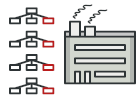
C# 抽象工厂模式讲解和代码示例
抽象工厂是一种创建型设计模式, 它能创建一系列相关的对象, 而无需指定其具体类。
抽象工厂定义了用于创建不同产品的接口, 但将实际的创建工作留给了具体工厂类。 每个工厂类型都对应一个特定的产品变体。
在创建产品时, 客户端代码调用的是工厂对象的构建方法, 而不是直接调用构造函数 ( new操作符)。 由于一个工厂对应一种产品变体, 因此它创建的所有产品都可相互兼容。
客户端代码仅通过其抽象接口与工厂和产品进行交互。 该接口允许同一客户端代码与不同产品进行交互。 你只需创建一个具体工厂类并将其传递给客户端代码即可。
如果你不清楚工厂、 工厂方法和抽象工厂模式之间的区别, 请参阅工厂模式比较。
复杂度:
流行度:
使用示例: 抽象工厂模式在 C# 代码中很常见。 许多框架和程序库会将它作为扩展和自定义其标准组件的一种方式。
识别方法: 我们可以通过方法来识别该模式——其会返回一个工厂对象。 接下来, 工厂将被用于创建特定的子组件。
概念示例
本例说明了抽象工厂设计模式的结构并重点回答了下面的问题:
- 它由哪些类组成?
- 这些类扮演了哪些角色?
- 模式中的各个元素会以何种方式相互关联?
Program.cs: 概念示例
using System;
namespace RefactoringGuru.DesignPatterns.AbstractFactory.Conceptual
{
// The Abstract Factory interface declares a set of methods that return
// different abstract products. These products are called a family and are
// related by a high-level theme or concept. Products of one family are
// usually able to collaborate among themselves. A family of products may
// have several variants, but the products of one variant are incompatible
// with products of another.
public interface IAbstractFactory
{
IAbstractProductA CreateProductA();
IAbstractProductB CreateProductB();
}
// Concrete Factories produce a family of products that belong to a single
// variant. The factory guarantees that resulting products are compatible.
// Note that signatures of the Concrete Factory's methods return an abstract
// product, while inside the method a concrete product is instantiated.
class ConcreteFactory1 : IAbstractFactory
{
public IAbstractProductA CreateProductA()
{
return new ConcreteProductA1();
}
public IAbstractProductB CreateProductB()
{
return new ConcreteProductB1();
}
}
// Each Concrete Factory has a corresponding product variant.
class ConcreteFactory2 : IAbstractFactory
{
public IAbstractProductA CreateProductA()
{
return new ConcreteProductA2();
}
public IAbstractProductB CreateProductB()
{
return new ConcreteProductB2();
}
}
// Each distinct product of a product family should have a base interface.
// All variants of the product must implement this interface.
public interface IAbstractProductA
{
string UsefulFunctionA();
}
// Concrete Products are created by corresponding Concrete Factories.
class ConcreteProductA1 : IAbstractProductA
{
public string UsefulFunctionA()
{
return "The result of the product A1.";
}
}
class ConcreteProductA2 : IAbstractProductA
{
public string UsefulFunctionA()
{
return "The result of the product A2.";
}
}
// Here's the the base interface of another product. All products can
// interact with each other, but proper interaction is possible only between
// products of the same concrete variant.
public interface IAbstractProductB
{
// Product B is able to do its own thing...
string UsefulFunctionB();
// ...but it also can collaborate with the ProductA.
//
// The Abstract Factory makes sure that all products it creates are of
// the same variant and thus, compatible.
string AnotherUsefulFunctionB(IAbstractProductA collaborator);
}
// Concrete Products are created by corresponding Concrete Factories.
class ConcreteProductB1 : IAbstractProductB
{
public string UsefulFunctionB()
{
return "The result of the product B1.";
}
// The variant, Product B1, is only able to work correctly with the
// variant, Product A1. Nevertheless, it accepts any instance of
// AbstractProductA as an argument.
public string AnotherUsefulFunctionB(IAbstractProductA collaborator)
{
var result = collaborator.UsefulFunctionA();
return $"The result of the B1 collaborating with the ({result})";
}
}
class ConcreteProductB2 : IAbstractProductB
{
public string UsefulFunctionB()
{
return "The result of the product B2.";
}
// The variant, Product B2, is only able to work correctly with the
// variant, Product A2. Nevertheless, it accepts any instance of
// AbstractProductA as an argument.
public string AnotherUsefulFunctionB(IAbstractProductA collaborator)
{
var result = collaborator.UsefulFunctionA();
return $"The result of the B2 collaborating with the ({result})";
}
}
// The client code works with factories and products only through abstract
// types: AbstractFactory and AbstractProduct. This lets you pass any
// factory or product subclass to the client code without breaking it.
class Client
{
public void Main()
{
// The client code can work with any concrete factory class.
Console.WriteLine("Client: Testing client code with the first factory type...");
ClientMethod(new ConcreteFactory1());
Console.WriteLine();
Console.WriteLine("Client: Testing the same client code with the second factory type...");
ClientMethod(new ConcreteFactory2());
}
public void ClientMethod(IAbstractFactory factory)
{
var productA = factory.CreateProductA();
var productB = factory.CreateProductB();
Console.WriteLine(productB.UsefulFunctionB());
Console.WriteLine(productB.AnotherUsefulFunctionB(productA));
}
}
class Program
{
static void Main(string[] args)
{
new Client().Main();
}
}
}
Output.txt: 执行结果
Client: Testing client code with the first factory type...
The result of the product B1.
The result of the B1 collaborating with the (The result of the product A1.)
Client: Testing the same client code with the second factory type...
The result of the product B2.
The result of the B2 collaborating with the (The result of the product A2.)